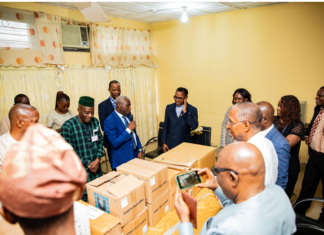The recent decision of the ECOWAS court to penalise Nigerian security forces for killing six citizens at Apo Village near Abuja is a wake-up call for Nigeria to mind her rights observance profile, writes Correspondent, SAM NWOKORO.
The Economic Community of West African States (ECOWAS) court in Abuja has resolved the long standing suit between some citizens and the government.
Eight Nigerian motorcyclists were shot dead in an uncompleted building by men of the Nigerian army and Department of State Services (DSS) in September 2013, and the shooting sparked local and international outrage. The killers claimed they were hunting for Boko Haram insurgents near the Apo Legislative Quarters in Abuja.
Aside the eight, 11 others were wounded by gunshots during the raid.
Reprieve
But last week, reprieve came the way of the justice-seekers as the ECOWAS court finally put a seal on the emotional outrage by holding that their killing was unlawful and could not be defended by the security forces concerned. It consequently found the Nigerian government guilty of extra-judicial killing.
Consequently, the court ordered the payment of $200,000 to the families of each of the persons killed in the raid, and $150,000 to the injured.
The court rejected the argument that the killing occurred in the course of maintaining the rule of law. It held that though the Nigerian government has a duty to maintain law and order in the society, “it has corresponding duty to protect innocent citizens caught in the crossfire as well as provide remedy for victims who suffer loss of body parts and property in the crossfire under international humanitarian law”.
The case was last heard on May 10, 2016. Earlier arguments were heard on February 7, 2015 and November 30, 2015.
International and local outcry that attended the killing made the National Assembly to institute a probe into the killing.
Enter National Human Rights Commission
In an 83-page report presented on the matter in Abuja by the then Chairman of the National Human rights Commission (NHRC) Governing Council, Chidi Odinkalu, the commission also held that the sum of N135 million should be paid as compensation to the relatives of the victims. The commission therefore awarded N10 million to each of the bereaved families and N5 million to each of the 11 others that sustained injuries. It also directed that the office of the Attorney General of the Federation (AGF) must lodge the evidence of payment with the commission’s office within 30 days.
Maintaining that contrary to reports that the victims were Boko Haram members, NHRC said the security agents did not even interview those injured in the attack to verify that claim. Before the operation, the security agents should have interrogated the owners of the property where the squatters were killed. It also said that no ammunition was shown to have been recovered from the property where the killing took place.
It also stated that the claim by security agents that the squatters were the first to open fire was not believable in the circumstance.
The council urged the military and the DSS to undertake a review and harmonisation of the Rules of Engagement governing the operations of security agencies, to bring them into compliance with the applicable rules of international humanitarian law governing non-international armed conflicts. It also asked the security agents to file a certified text of the harmonised and updated rules of engagement with the commission within two months.
The report read in part: “Having investigated this complaint, heard all the parties and examined the relevant laws, the NHRC, exercising its powers under Sections 5 and 6 of the NHRC Act, 2010 (as amended), hereby determines and declares that: ‘At the time of the lethal encounter giving rise to this complaint on or about September 20, 2013, there was a Non-International Armed Conflict (NIAC) going on in North East Nigeria involving the Armed Forces of the Federal Republic of Nigeria on the one hand and an organised armed group, Jama’atu ahlus sunnah lid da’awati wal jihad also known as ‘Boko Haram’, on the other. The theatre of active conflict extended to Abuja, the Federal Capital Territory.
“With reference to the existence of a NIAC in Nigeria, the rules of international humanitarian law, including, in particular, common Article 3 of the Geneva Conventions, are applicable to the parties to the conflict. The rules of human rights law under the Nigerian constitution and other relevant laws supplement international humanitarian law in the theatres of conflict and remain applicable outside those theatres.
“There is no credible evidence to suggest or show that the victims in this case were members of … (Boko Haram) or involved in direct participation in hostilities. They were, therefore, protected civilian non-combatants.
“The defence of self-defence asserted by the respondents is not supported by the facts or evidence.
“Taking account of all the circumstances in this case, the application of lethal force was disproportionate and the killings of the eight persons as well as the injuries to the 11 survivors were unlawful and there is no basis in law for confining detainees freed by the respondents to internal banishment.”
Bandwagon
The judgment of the ECOWAS court, being the first it would deliver on matters such as this since its presence in a Nigerian legal suit, will undoubtedly open the floodgate of litigations bordering on rights abuses, as Nigerians have been getting it through the law enforcement agents in recent times.
It is the opinion of analysts like Professor Epiphany Azinge that the presence of ECOWAS would serve as an early warning signal for member nations to stick to the independence of the judiciary all the times. He sees the ECOWAS court as capable of influencing member states in the discharge of judicial duties without fear, since at the end of the Supreme Court decisions, another window still exists.












